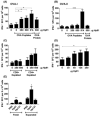HMGB1-derived peptide acts as adjuvant inducing immune responses to peptide and protein antigen
- PMID: 20800114
- PMCID: PMC2963688
- DOI: 10.1016/j.vaccine.2010.08.054
HMGB1-derived peptide acts as adjuvant inducing immune responses to peptide and protein antigen
Abstract
There is a need for new adjuvants that will induce immune responses to subunit vaccines. We show that a short peptide, named Hp91, whose sequence corresponds to an area within the endogenous molecule high mobility group box (HMGB1) protein 1 potentiates cellular immune responses to peptide antigen and cellular and humoral immune responses to protein antigen in vivo. Hp91 promoted the in vivo production of the immunomodulatory cytokines, IFN-γ, TNF-α, IL-6, and IL-12 (p70), as well as antigen-specific activation of CD8+ T cells. These results demonstrate the ability of a short immunostimulatory peptide to serve as an adjuvant for subunit vaccines.
Copyright © 2010 Elsevier Ltd. All rights reserved.
Figures





References
-
- Singh M, O_Hagan D. Advances in vaccine adjuvants. Nature Biotechnology. 1999;17(11):1075–1081. - PubMed
-
- McCluskie MJ, Weeratna RD. Novel adjuvant systems. 2001;1(3):263–271. - PubMed
-
- Singh M, O'Hagan DT. Recent advances in vaccine adjuvants. Pharm Res. 2002;19(6):715–728. - PubMed
-
- Kovarik J, Siegrist CA. The search for novel adjuvants for early life vaccinations: can “danger” motifs show us the way? 2001;49(3):209–215. - PubMed
-
- Chisari FV, Ferrari C. Hepatitis B virus immunopathogenesis. Annual Review of Immunology. 1995;13:29–60. - PubMed
Publication types
MeSH terms
Substances
Grants and funding
LinkOut - more resources
Full Text Sources
Other Literature Sources
Research Materials

